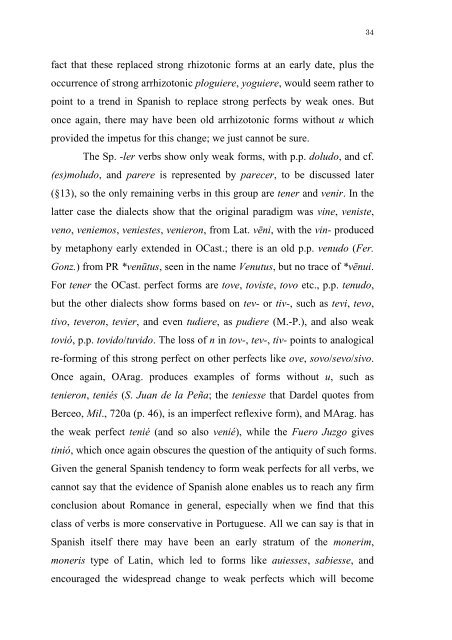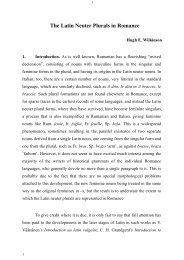THE STRONG PERFECTS IN THE ROMANCE ... - Page ON
THE STRONG PERFECTS IN THE ROMANCE ... - Page ON
THE STRONG PERFECTS IN THE ROMANCE ... - Page ON
Create successful ePaper yourself
Turn your PDF publications into a flip-book with our unique Google optimized e-Paper software.
fact that these replaced strong rhizotonic forms at an early date, plus the<br />
occurrence of strong arrhizotonic ploguiere, yoguiere, would seem rather to<br />
point to a trend in Spanish to replace strong perfects by weak ones. But<br />
once again, there may have been old arrhizotonic forms without u which<br />
provided the impetus for this change; we just cannot be sure.<br />
The Sp. -ler verbs show only weak forms, with p.p. doludo, and cf.<br />
(es)moludo, and parere is represented by parecer, to be discussed later<br />
(§13), so the only remaining verbs in this group are tener and venir. In the<br />
latter case the dialects show that the original paradigm was vine, veniste,<br />
veno, veniemos, veniestes, venieron, from Lat. vēni, with the vin- produced<br />
by metaphony early extended in OCast.; there is an old p.p. venudo (Fer.<br />
Gonz.) from PR *venūtus, seen in the name Venutus, but no trace of *vēnui.<br />
For tener the OCast. perfect forms are tove, toviste, tovo etc., p.p. tenudo,<br />
but the other dialects show forms based on tev- or tiv-, such as tevi, tevo,<br />
tivo, teveron, tevier, and even tudiere, as pudiere (M.-P.), and also weak<br />
tovió, p.p. tovido/tuvido. The loss of n in tov-, tev-, tiv- points to analogical<br />
re-forming of this strong perfect on other perfects like ove, sovo/sevo/sivo.<br />
Once again, OArag. produces examples of forms without u, such as<br />
tenieron, teniés (S. Juan de la Peña; the teniesse that Dardel quotes from<br />
Berceo, Mil., 720a (p. 46), is an imperfect reflexive form), and MArag. has<br />
the weak perfect tenié (and so also venié), while the Fuero Juzgo gives<br />
tinió, which once again obscures the question of the antiquity of such forms.<br />
Given the general Spanish tendency to form weak perfects for all verbs, we<br />
cannot say that the evidence of Spanish alone enables us to reach any firm<br />
conclusion about Romance in general, especially when we find that this<br />
class of verbs is more conservative in Portuguese. All we can say is that in<br />
Spanish itself there may have been an early stratum of the monerim,<br />
moneris type of Latin, which led to forms like auiesses, sabiesse, and<br />
encouraged the widespread change to weak perfects which will become<br />
34









